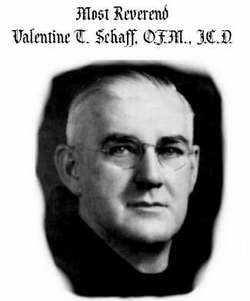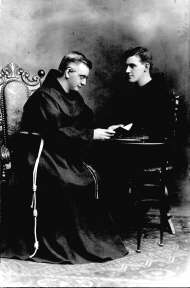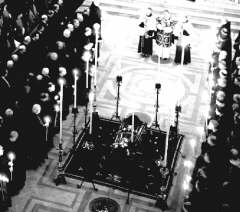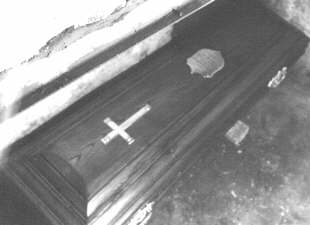After teaching for nine years at St. Francis Prep., and just at the end of the Great War, Father Valentine was sent to the Catholic University in Washington, D.C. He enrolled in the canon law school, obtaining in 1921, a doctorate 'summa cum laude' in canon law.
Returning to the Cincinnati Province, Father Valentine spent two years at Oldenburg as lector in theology, and then was called back to the Catholic University as an associate professor of canon law. While teaching there, many of the articles written by Fr. Valentine were published in leading ecclesiastical reviews. During this period, he became recognized as a leading authority in canonical jurisprudence.
The value of his work is evidenced by his appointment in 1933 as dean of the canon law faculty at the Catholic University in Washington. Serving in this position until 1937, he was called upon to participate in the International Congress of Jurisprudence in 1934, making thus his first visit to Rome. Returning to Washington, where until 1939 he continued his duties as professor, and was also elected to the office of the Order's Provincial Definitorium. Later that same year, he was elected General Definitor for the English-speaking Friars with residence in Rome, thus becoming a member of the General Definitorium of the Order.
With the Second World War already underway in Europe, this appointment was, in effect, a sentence of exile from the USA. Never one to waste time, Father Valentine assumed teaching duties at the Pontifical Athenaeum Antonianum, and maintained his literary output. In 1940 he was appointed consultor to the Sacred Congregation of the Sacraments. In late 1944, as the war was drawing to a close, the Minister General of the Order, Fr. Leonard Maria Bello died. Fr. Valentine was selected by Pope Pius XII to become Minister General.
On Sunday evening of December 1, 1946, the Father General arose about 5.30 am., when Brother Julio heard him coughing. He went into his private chapel to say Mass about 6 o'clock. He prepared the Missal that seems about as far as he got. He must have wished to return to his bed, but collapsed upon it. Since the Brother had been often told by the General not to disturb him if he returned to bed, he did not go back to the apartments of the General until about 7 o'clock. On finding him unconscious, breathing heavily, he called Brother Genesso, the infirmarian, who immediately got Doctor Franze, the friar house doctor, and Father Schmoll, who administered the sacrament of extreme unction. Two other lay doctors were immediately called, but, when they arrived between 9 and 10 o'clock, they found they could do no more than approve what Doctor Franze had already done. It was a cerebral hemorrhage, a stroke, that had afflicted the General. The Holy Father was immediately notified and about 9'o clock he sent his personal blessings.
In order to drain the blood off the brain, the doctor opened up veins in both arms. A quantity of dark thick blood came out. At 10 o'clock the doctor said that if he lived forty-eight hours he would have a chance.
The General never regained consciousness. Around 3.30 began to have extraordinary difficulty in breathing, which the doctor and the infirmarian could not relieve even by their most tireless and painstaking efforts. Gradually the pulse grew weaker and at 4.45 pm., December 1, 1946, he breathed his last very quietly. The room was filled with the Fathers of the Definitorium end other Friars reciting the prayers for the dying. He was 63 years of age.
Immediately after his death, his body was dressed in his habit and a purple stole placed around his neck. He lay on the bed on which he died. All night long a vigil was kept by the friars, students of the Athenaeum and many others who dropped in for the repose of his soul.
Funeral Mass was said on December 5, 1946, at St. Anthony's church in Rome. The Minister General's body was successively interred underneath the altar of St. Bonaventure in the church of Ara Coeli.
After teaching for nine years at St. Francis Prep., and just at the end of the Great War, Father Valentine was sent to the Catholic University in Washington, D.C. He enrolled in the canon law school, obtaining in 1921, a doctorate 'summa cum laude' in canon law.
Returning to the Cincinnati Province, Father Valentine spent two years at Oldenburg as lector in theology, and then was called back to the Catholic University as an associate professor of canon law. While teaching there, many of the articles written by Fr. Valentine were published in leading ecclesiastical reviews. During this period, he became recognized as a leading authority in canonical jurisprudence.
The value of his work is evidenced by his appointment in 1933 as dean of the canon law faculty at the Catholic University in Washington. Serving in this position until 1937, he was called upon to participate in the International Congress of Jurisprudence in 1934, making thus his first visit to Rome. Returning to Washington, where until 1939 he continued his duties as professor, and was also elected to the office of the Order's Provincial Definitorium. Later that same year, he was elected General Definitor for the English-speaking Friars with residence in Rome, thus becoming a member of the General Definitorium of the Order.
With the Second World War already underway in Europe, this appointment was, in effect, a sentence of exile from the USA. Never one to waste time, Father Valentine assumed teaching duties at the Pontifical Athenaeum Antonianum, and maintained his literary output. In 1940 he was appointed consultor to the Sacred Congregation of the Sacraments. In late 1944, as the war was drawing to a close, the Minister General of the Order, Fr. Leonard Maria Bello died. Fr. Valentine was selected by Pope Pius XII to become Minister General.
On Sunday evening of December 1, 1946, the Father General arose about 5.30 am., when Brother Julio heard him coughing. He went into his private chapel to say Mass about 6 o'clock. He prepared the Missal that seems about as far as he got. He must have wished to return to his bed, but collapsed upon it. Since the Brother had been often told by the General not to disturb him if he returned to bed, he did not go back to the apartments of the General until about 7 o'clock. On finding him unconscious, breathing heavily, he called Brother Genesso, the infirmarian, who immediately got Doctor Franze, the friar house doctor, and Father Schmoll, who administered the sacrament of extreme unction. Two other lay doctors were immediately called, but, when they arrived between 9 and 10 o'clock, they found they could do no more than approve what Doctor Franze had already done. It was a cerebral hemorrhage, a stroke, that had afflicted the General. The Holy Father was immediately notified and about 9'o clock he sent his personal blessings.
In order to drain the blood off the brain, the doctor opened up veins in both arms. A quantity of dark thick blood came out. At 10 o'clock the doctor said that if he lived forty-eight hours he would have a chance.
The General never regained consciousness. Around 3.30 began to have extraordinary difficulty in breathing, which the doctor and the infirmarian could not relieve even by their most tireless and painstaking efforts. Gradually the pulse grew weaker and at 4.45 pm., December 1, 1946, he breathed his last very quietly. The room was filled with the Fathers of the Definitorium end other Friars reciting the prayers for the dying. He was 63 years of age.
Immediately after his death, his body was dressed in his habit and a purple stole placed around his neck. He lay on the bed on which he died. All night long a vigil was kept by the friars, students of the Athenaeum and many others who dropped in for the repose of his soul.
Funeral Mass was said on December 5, 1946, at St. Anthony's church in Rome. The Minister General's body was successively interred underneath the altar of St. Bonaventure in the church of Ara Coeli.
Sponsored by Ancestry
Advertisement
Explore more
Sponsored by Ancestry
Advertisement





